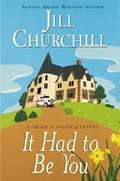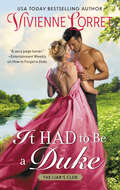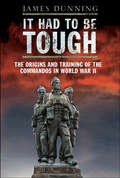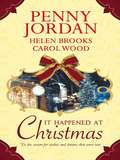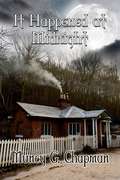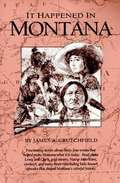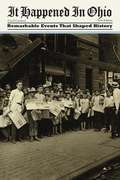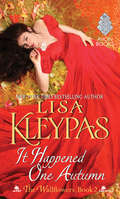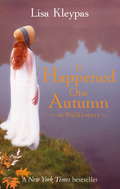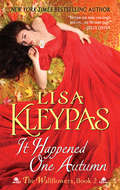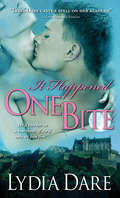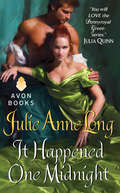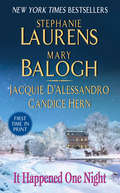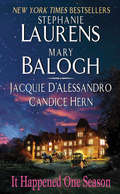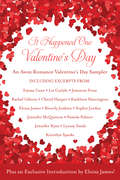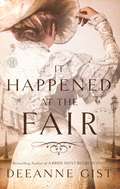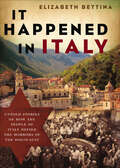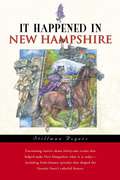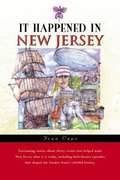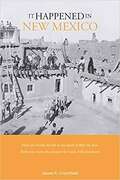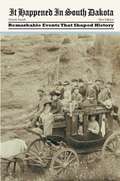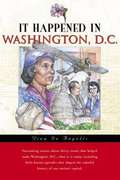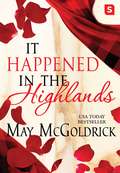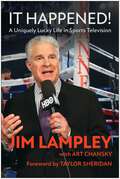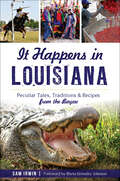- Table View
- List View
It Had to Be You (Grace and Favor Mysteries #5)
by Jill Churchill[From the dust jacket flaps:] Award-winning author Jill Churchill takes us back to beautiful Grace & Favor, the tiny town along the Hudson River known for tradition, charm... and murder March 3, 1933, the day before Franklin Roosevelt's inauguration. While Robert Brewster heads to Washington, D.C., to witness the historic event, his sister, Lily, travels to a nursing home near Grace & Favor. The owner, Miss Twibell, has lost an assistant nurse, and the siblings have agreed to help out. The home is full of colorful characters, including a cantankerous old man named Sean Connor, the only patient who is seriously ill. The very day the Brewsters arrive, he slips into a coma and passes away. Though saddened, no one is surprised by his death--until it's revealed that he's been murdered. The old man wasn't well liked, but who would bother to murder him when he had so little time left? Several people had visited his room that morning, and there are plenty of suspects. Good motives, on the other hand, are thin on the ground. And Mr. Connor isn't the only victim in town. Over the winter, a young man went missing and was presumed dead, though no body was found. Now that the spring sun has melted the ice, a body has surfaced. Is this the missing man or has a third crime been committed? With multiple murders plaguing the community, the Brewster siblings are more committed than ever to helping the police find a cold-blooded criminal before he strikes again. If you enjoyed this book you'll be pleased to know that more books by Jill Churchill are in the Bookshare Library including several books in her Jane Jeffry series including #1. Grime and Punishment, #2. A Farewell to Yarns, #6 From Here to Paternity, #8. War and Peas, #10. The Merchant of Menace, #11 A Groom with a view, #13 The House of Seven Mabels, #15 A Midsummer Night's Scream, #16 The Accidental Florist, with more on the way.
It Had to Be a Duke: A Novel (The Liars' Club #1)
by Vivienne LorretUSA Today bestselling author Vivienne Lorret launches a new series with a sparkling romance about a spinster, a duke, and a fake engagement that blurs the lines between enemies and lovers…Verity Hartley always tells the truth. Well, mostly. However, when her snooty neighbor returns to their small hamlet to brag about having a grand Season, a plethora of ballgowns, and so many suitors that she cannot possibly decide which one to marry, Verity tells a lie. She claims to be betrothed. To a duke. Who happens to be her family’s sworn enemy. But what are the odds that he would ever learn of this one, little, harmless falsehood?Magnus Warring, the Duke of Longhurst, is on the precipice of marrying an heiress to save his estate from financial ruin. At least, he was. Until he hears an unbelievable rumor that he is already betrothed. To the daughter of a liar, cheat, and swindler! Needing to protect his reputation, he hunts down the culprit. And when he finds the untamed beguiler, she has the audacity to ask him to lie for her. To pretend to be her fiancé!One week, that’s all Verity needs. Then Magnus can return to his life. But nothing is ever that simple. Sometimes it doesn’t take that long to fall in love, even with the enemy.
It Had to be Tough: British Commandos In The Second World War
by James DunningThis book tells the fascinating story of the origins of the Commandos (Britain's first Special Service troops and the forerunners of today's Parachute Regiment, the SAS and the SBS) and the development of their special training in World War II. The commandos were raised on the specific and personal orders of the prime minister, Winston Churchill, in the dark days of the summer of 1940 when these islands faced the real threat of a Nazi invasion. It was a bold, but typically Churchillian, decision.The book traces the formation of the Commandos and the development of the extreme and often unorthodox training methods and techniques used to prepare the volunteers from all branches of the British Army for subsequent world-wide-operations from 'bolt and butcher' raids to the 'great raids' on Norway and France and finally their employment in the full scale invasions of North Africa. Sicily, Italy, Normandy, the Crossing of the Rhine and finally in Burma, whilst at all times fostering that indomitable fighting spirit with which the name 'Commando' became synonymous. So great was the Commandos' contribution in that war that the Army Commandos were awarded thirty eight Battle Honors and these are emblazoned on the Commando Flag which hangs in Westminster Abbey. Arguably the Army Commandos were disbanded too hastily after the War but their legacy, traditions and fighting spirit lives with those artillery, engineer and corps troops who today win their coveted 'Green Berets' and serve alongside their comrades of the Royal Marines on active service today.
It Happened At Christmas
by Penny Jordan Helen Brooks Carol WoodExperience the love, warmth and magic Christmas brings, with this heartwarming collection from three favorite Harlequin authorsSo much stands between Lancashire mill owner Haywood Denshaw and his new housekeeper Marianne Brown. But even disparate social standing and rumors of disreputable pasts can't get in the way of their love. Only Marianne's refusal to compromise her principlescan,in a captivating story byPENNY JORDAN. Wealthy farmer Luke Hudson gets more than he bargained for when he plucks a destitute young woman from the workhouse. He may have rescued Connie Summers from a life of penury and hard labor, but her spirit and warmth give him a new outlook-and a second chance at love, in an enthralling story byHELEN BROOKS. Modern-thinking doctor Harry Fleet and compassionate but old-school nurse Tilly Dainty clash at the Tap House surgery in 1920s East London. But working together to care for the sick and needy turns out to be a healing balm on both their hearts, in an emotional story byCAROL WOOD.
It Happened At Midnight
by Muncy ChapmanWas it any wonder that Amanda Wilkes felt apprehensive about moving from New Orleans to her new home in rural Mississippi? In a settlement with the ominous name of "Midnight," how could she expect to find anything but mystery and danger? And the stories she heard about the outlaws and robbers who frequented the nearby infamous Natchez Trace did nothing to calm her fears. When Pastor Wilkes and his three daughters moved to Mississippi, he never imagined the perilous life they would face, filled with fears and danger, and yes, even humor and romance.
It Happened In Montana
by James A. CrutchfieldIf Montana history is a river through time, then here are the nuggets panned from the flow. Author James A. Crutchfield has mined thirty- four of the most colorful episodes from Montana's provocative past—from the first glimpse by French explorers of the “Shining Mountains” in 1743, to the recent attempt to round up the wild horses of the Pryor Mountains. Together, these episodes comprise It Happened in Montana, a lively look at life in the Wild West. Along the way, Crutchfield introduces a cast of fascinating characters who have made their mark on the Treasure State. Among them are outlaw/sheriff Henry Plummer, copper kings Marcus Daly and William Clark, mountain man “Liver-Eating” Johnston, cowboy artist Charlie Russell, peace- loving Congresswoman Jeannette Rankin, and perceptive Plenty Coups, chief of the Crows. As the author himself acknowledges, “these vignettes don’t in any way purport to be a thorough history of the state.” Rather, they are the gold that glitters in the pan. Read them and grow richer.
It Happened In Ohio: Remarkable Events That Shaped History (It Happened)
by Carol CartainoThe It Happened In series has delighted history buffs, tourists, and local residents for nearly twenty years with lively, easy-to- read, short glimpses into both little-known and extensively chronicled events that have shaped American history.
It Happened One Autumn
by Lisa KleypasFour young ladies enter London society with one necessary goal: they must use their feminine wit and wiles to find a husband. So they band together, and a daring husband-hunting scheme is born. It Happened at the Ball... Where beautiful but bold Lillian Bowman quickly learned that her independent American ways weren't entirely "the thing." And the most disapproving of all was insufferable, snobbish, and impossible Marcus, Lord Westcliff, London's most eligible aristocrat. It Happened in the Garden... When Marcus shockingly -- and dangerously-swept her into his arms. Lillian was overcome with a consuming passion for a man she didn't even like. Time stood still; it was as if no one else existed...thank goodness they weren't caught very nearly in the act! It Happened One Autumn... Marcus was a man in charge of his own emotions, a bedrock of stability. But with Lillian, every touch was exquisite torture, every kiss an enticement for more. Yet how could he consider taking a woman so blatantly unsuitable...as his bride?
It Happened One Autumn: The Wallflowers, Book 2 (The Wallflowers #2)
by Lisa KleypasFrom the New York Times bestselling author Lisa Kleypas comes the next title in the beloved romance series The Wallflowers - perfect for fans of Sarah MacLean, Julia Quinn and Eloisa James. 'Kleypas can make you laugh and cry - on the same page' Julia Quinn, Sunday Times bestselling author of the Bridgerton series The Wallflowers: four young ladies at the side of the ballroom make a pact to help each other find husbands . . . no matter what it takesIt happened at the ball . . . Where beautiful but bold Lillian Bowman quickly learned that her independent American ways weren't entirely 'the thing'. And the most disapproving of all was insufferable, snobbish, and impossible Marcus, Lord Westcliff, London's most eligible aristocrat. It happened in the garden . . .When Marcus shockingly - and dangerously - swept her into his arms. Lillian was overcome with a consuming passion for a man she didn't even like. Time stood still; it was as if no one else existed. It happened one autumn . . . Marcus was a man in charge of his own emotions, a bedrock of stability. But with Lillian, every touch was exquisite torture, every kiss an enticement for more. Yet how could he consider taking a woman so blatantly unsuitable . . . as his bride? 'Lisa Kleypas is the best' Sarah MacLean The Wallflowers: Secrets of a Summer Night It Happened One Autumn The Devil in Winter Scandal in Spring A Wallflower ChristmasPraise for Lisa Kleypas'Lushly sexy and thoroughly romantic . . . superbly crafted characters and an intriguing plot blend together brilliantly in this splendid romance' Booklist 'Intricately and elegantly crafted, intensely romantic . . . from a not-to-be-missed romance author' Kirkus Reviews'Witty, often hilarious, and delightfully passionate' Library Journal, starred review 'An unforgettable story peopled with remarkable characters and a depth of emotion that will leave you breathless' Romantic Times BOOKreviews'Is it possible to give a book 6 stars? . . . [This] story has all of the forbidden romance, witty banter, and sigh-inducing declarations of love that you deserve' That's Normal
It Happened One Autumn: The Wallflowers, Book 2 (Wallflowers #2)
by Lisa KleypasHeadstrong American heiress Lillian Bowman has come to England to find an aristocratic husband. Unfortunately, no man is strong enough to tame the stubborn beauty's fierce will. Except, perhaps, the powerful and arrogant Earl of Westcliff—a man Lillian despises more than anyone she's ever met.Marcus, Lord Westcliff, is famous for his icy English reserve and his supreme self-control. But something about the audacious Lillian drives him mad. Whenever they're in the same room, they can't stop themselves from battling furiously to gain the upper hand.Then one afternoon, a stunningly sensuous encounter changes everything . . . and Lillian discovers that beneath the earl's reserved façade, he is the passionate and tender lover of her dreams. What neither Westcliff nor Lillian suspect, however, is that a sinister conspiracy threatens to destroy any chance of happiness. After a shocking betrayal endangers Lillian's safety—and possibly her life—will Marcus be able to save her before it's too late?
It Happened One Bite (Gentleman Vampires #1)
by Lydia DareFrom a castle in the rugged Scottish Highlands to the glittering salons of Edinburgh high society, the playground for the rich, titled and undead will never be the same when ultra-correct gentleman vampire Lord Kettering and feisty witch Blaire Lindsay make sparks fly.
It Happened One Midnight
by Julie Anne LongMore than one beautiful womans hopeshave been dashed on the rocky shoals ofJonathan Redmonds heart. With his rivetinggood looks and Redmond wealth and power, the world is his oyster--until an ultimatumfrom his father and a chilling gypsy prophecysend him hurtling headlong toward a fatehell do anything to avoid: matrimony. Intoxicating, elusive Thomasina de Ballesteroshas the bloods of London at her feet. But noneof them knows the real Tommy--the one witha shocking pedigree, a few too many secrets, and a healthy scorn for rakes like Jonathan. Shes everything Jonathan never wanted. But on one fateful midnight, hes drawn intoTommys world of risk, danger . . . and a desirehed never dreamed possible. And suddenlyhes re-thinking everything . . . includingthe possibility that succumbing to prophecymight just mean surrendering to love.
It Happened One Night
by Mary Balogh Stephanie Laurens Candice Hern Jacquie D'AlessandroIt Happened One Night . . . and nothing was ever the same again! Once upon a time, four superstar storytellers-New York Times bestselling authors Stephanie Laurens and Mary Balogh, along with Jacquie D'Alessandro and Candice Hern-came up with a delicious idea. What if they each wrote a story about a proper young lady stranded at a remote inn away from society's constraints? What would happen? And how long would it take for her to give in to desire? In these four amazing tales, four heroines will come face-to-face with the men who got away . . . only to discover that, instead of anger, there is still a passionate connection that cannot be denied. And while each of their lives is quite different, and their pasts utterly unique, they will all make a common discovery-that one night can change everything . . . forever.
It Happened One Season
by Mary Balogh Stephanie Laurens Candice Hern Jacquie D'AlessandroWe asked our readers what story they would most like to see from four bestselling authors. They responded . . . A handsome hero returns from war, battle-scarred and world-weary. But family duty calls and he must find a bride. A young lady facing yet another season without a suitor never expects to find herself the object of his affections. It Happened One Season Four amazing talents Stephanie Laurens Mary Balogh Jacquie D'Alessandro and Candice Hern have come together to create one of the most unforgettable events of the year. The results are spectacular-each story is as unique as a lover's first kiss.
It Happened One Valentine's Day: An Avon Romance Valentine's Day Sampler
by Eloisa JamesCelebrate Valentine's Day with Avon Books and an enchanting free e-book sampler, It Happened One Valentine's Day. With excerpts from fourteen new, upcoming, and fan favorite Avon and Avon Impulse novels and novellas, including an introduction from Eloisa James. It Happened One Valentine's Day: An Avon Romance Valentine's Day Sampler includes excerpts from: The Trouble with Valentine's Day by Rachel Gibson Once Upon a Tower by Eloisa James Immortal Ever After by Lynsay Sands Twice Tempted by Jeaniene Frost Bride by Moonlight by Liz Carlyle "V is for Vampwoman" (from Vampires Gone Wild) by Kerrelyn Sparks "A Forever Love" (from Vampires Gone Wild) by Pamela Palmer True Love at Silver Creek Ranch by Emma Cane "Love Me Tender" (from Kiss Me: An Avon Books Valentine Day Anthology) by Cheryl Harper Saved by the Rancher by Jennifer Ryan The Earl in My Bed by Sophie Jordan What Happens in Scotland by Jennifer McQuiston Destiny's Embrace by Beverly Jenkins The Maclean Groom by Kathleen Harrington
It Happened at the Fair
by Deeanne GistA transporting historical novel about a promising young inventor, his struggle with loss, and the attractive teacher who changes his life, all set against the razzle-dazzle of the 1893 Chicago World's Fair.Gambling everything, including the family farm, Cullen McNamara travels to the 1893 Chicago World's Fair with his most recent invention. But the noise in the Fair's Machinery Palace makes it impossible to communicate with potential buyers. In an act of desperation, he hires Della Wentworth, a teacher of the deaf, to tutor him in the art of lip-reading. The young teacher is reluctant to participate, and Cullen has trouble keeping his mind on his lessons while intently watching her lips. Like the newly invented Ferris Wheel, he is caught in a whirl between his girl back home, his dreams as an inventor, and his unexpected attraction to his new tutor. Can he keep his feet on the ground, or will he be carried away?
It Happened in Italy: Untold Stories of How the People of Italy Defied the Horrors of the Holocaust
by Elizabeth BettinaIMAGINE ELIZABETH BETTINA&’S SURPRISE when she discovered that her grandmother&’s village had a secret: over a half century ago, many of Campagna&’s residents defied the Nazis and risked their lives to shelter and save hundreds of Jews during the Holocaust. What followed her discovery became an adventure as she uncovered fascinating untold stories of Jews in Italy during World War II and the many Italians who risked everything to save them. &“Finally, somebody made known the courage and the empathy of the majority of the Italian people toward us Jews at a time of great danger.&” —Nino Asocoli
It Happened in New Hampshire
by Barbara Radcliffe Rogers Stillman RogersIncludes the fall of the Old Man From its earliest settlements at Odiorne Point, Dover, and Portsmouth, New Hampshire was different from the other colonies. Its history holds many surprises and a number of events that were significant to the founding and growth of the United States. It Happened in New Hampshire reveals the fascinating stories behind thirty events that helped shape the state's history.
It Happened in New Jersey
by Frances CapoThis is a collection of short chapters, each recounting an unusual episode in New Jersey history. The pieces are arranged chronologically, beginning with the colonial era and ending with recent events such as the opening of casinos in Atlantic City. Incidents range from the weird (the origin of the Jersey Devil legend and the sightings of the demon over three centuries) to the well-known (the kidnapping of the Lindbergh baby). There are the shark attacks of 1916, and the "Black Tom Explosion" that may have been a German terrorist attack in the days before World War I.
It Happened in New Mexico (It Happened In Series)
by James A. Crutchfield James CrutchfieldNew Mexico comes alive in these fascinating stories about events that helped make New Mexico what it is today. <P><P> From the life and times of Folsom Man (9,000 BC) to the Great Prison Riot of Santa Fe County (1980 AD), It Happened in New Mexico tells the stories of intriguing people and events from the history of one of America’s most captivating states. Find out how Pancho Villa’s deadly raid on Columbus in March 1916 led to a $130 million—unsuccessful—mission to hunt down America’s arch enemy. Go back to July 16, 1945, when a busload of spectators pulled up to a scenic overlook to witness the explosion of the world’s first atomic bomb. Find out how Smokey the Bear began life as an imaginary symbol and ended up as the nation’s most beloved cub. Did the U.S. Army steal Doc Noss’s gold? Join the military cavalcade to Victorio Peak in 1977 and decide for yourself.
It Happened in South Dakota: Remarkable Events That Shaped History
by Patrick StraubA fascinating collection of thirty compelling stories about events that shaped the Mount Rushmore State, It Happened in South Dakota describes everything from Lewis and Clark raising an American flag on the Missouri to the continuing creation of a monument to Crazy Horse.
It Happened in Washington, D.C.
by Gina De AngelisThis is a highly readable collection of short essays about incidents in the history of the nation's capital. Among the topics covered are the grand plan of Pierre-Charles L'Enfant, Lincoln's assassination at Ford's Theater, and Marian Anderson's 1939 concert at the Lincoln Memorial. The book includes a D.C. chronology and a detailed bibliography. Part of the It Happened In series.
It Happened in the Highlands (The Pennington Family #2)
by May McGoldrickIt Happened in the Highlands is the next book in the new historical highland series, The Penningtons, from USA Today bestseller May McGoldrick...Lady Josephine Pennington was jilted by her fiancé once rumors spread about her questionable origins. Her adoptive parents have always provided her with the love and protection she’s needed to feel secure, and over the last sixteen years she’s molded herself to meet the expectations of others. When she receives a package containing sketches where the subject is eerily familiar, Jo believes she might have found a clue to the identity of her birth mother. <p><p> When Captain Wynne Melfort ended his engagement to Jo Pennington sixteen years ago, he never imagined he would see her again. But after he uncovers information that could reveal the truth about Jo’s parentage, Wynne feels bound by duty to right an old wrong and inform her of his find. He didn’t expect for feelings long thought dead to resurface, for in his mind a love departed was gone forever. <p> As they strive to unravel the mystery of her birth, Jo must learn how to trust the man who’d once rejected her and Wynne must reconcile his head with his heart. But as secrets of the past begin to surface, evil forces will stop at nothing to keep Jo from uncovering the truth and reclaiming her legacy. Together, Jo and Wynne must fight the deadly menace lurking deep in the Highland mists.
It Happened!: A Uniquely Lucky Life in Sports Television
by Art Chansky Jim LampleyFrom HBO&’s ringside face and voice of boxing, comes a first-person, blow-by-blow account of the evolution of sports television chock full of famous names, history-making events, and never-before-told stories from the world of sports.Jim Lampley&’s story is a 50-year travelog of an unlikely career that catalogs the evolution of sports television—from his emergence as the first sideline reporter, through hosting and covering 14 Olympics, to working with all major sports networks. It Happened! charts Jim&’s notable career, with highlights including: Becoming the first live reporter on the sideline of a nationally televised college football game Following in the footsteps of Jim McKay as host on ABC&’s Wide World of Sports and Howard Cosell as halftime host for ABC&’s Monday Night Football Partnering with ABC, CBS, NBC, Turner, and HBO Ascending to host of HBO&’s Wimbledon weekday telecasts Reaching &“icon&” status as the 30-year face and voice of HBO World Championship Boxing Learn how Jim&’s brilliance as an announcer and his revolutionary nature led to innovations in sportscasting, three sports Emmys, and induction into the International Boxing Hall of Fame. Personal anecdotes and hard-earned lessons combine as Jim digs deep and shares celebrity stories from the upper echelons of superstar athletes and Hollywood hotshots, but also offers an introspective look at his personal life and trials.
It Happens in Louisiana: Peculiar Tales, Traditions & Recipes from the Bayou
by Sam IrwinOnly in the Bayou State do Louisianans travel door to door on horseback collecting gumbo ingredients for Mardi Gras gatherings. Residents compete in egg pâquer contests to see who can crack their opponent's Easter egg first. Louisiana is a place where frequent collisions with natural disasters can inspire a drink like Pat O'Brien's famous hurricane. And the state's history is filled with colorful figures like Governor Earl K. Long, whose wife committed him to a mental institution--only for him to use his political pull to inspire his own release. Elsewhere these accounts may seem odd or farfetched, but it all happens in Louisiana. Join author Sam Irwin as he details these intriguing Pelican State stories with pithy observations, humorous asides and droll determinations.
